Just hours before cabinet invoked the Emergencies Act, Prime Minister Justin Trudeau’s national security adviser asked the RCMP in an email for a Freedom Convoy threat assessment and called the protesters “a threat to democracy.”
The email sequence was tabled with the Public Order Emergency Commission (POEC) on Nov. 15. The ongoing public inquiry is assessing whether the federal government met the legal threshold to invoke the act to clear Convoy protestors in Ottawa last winter.





